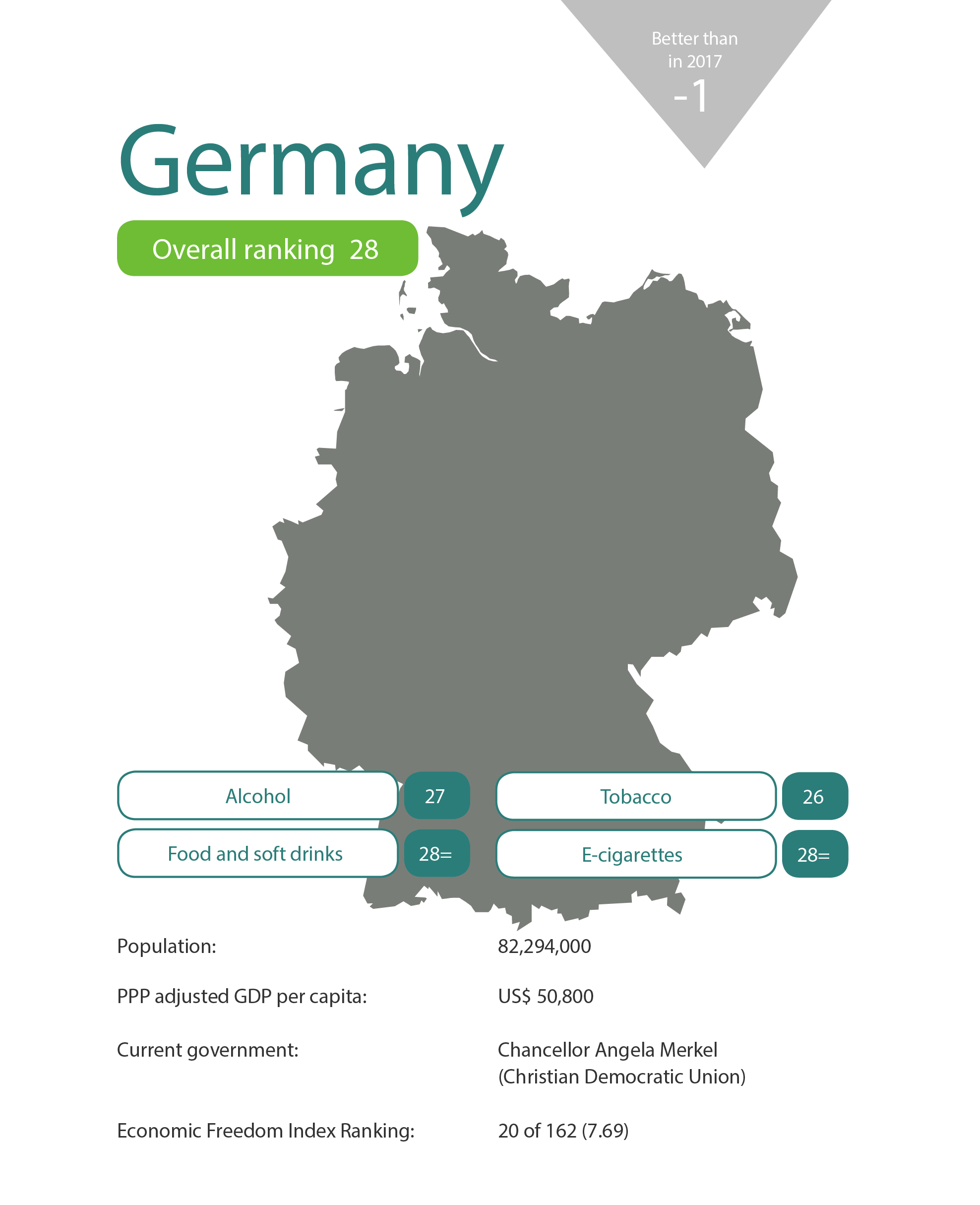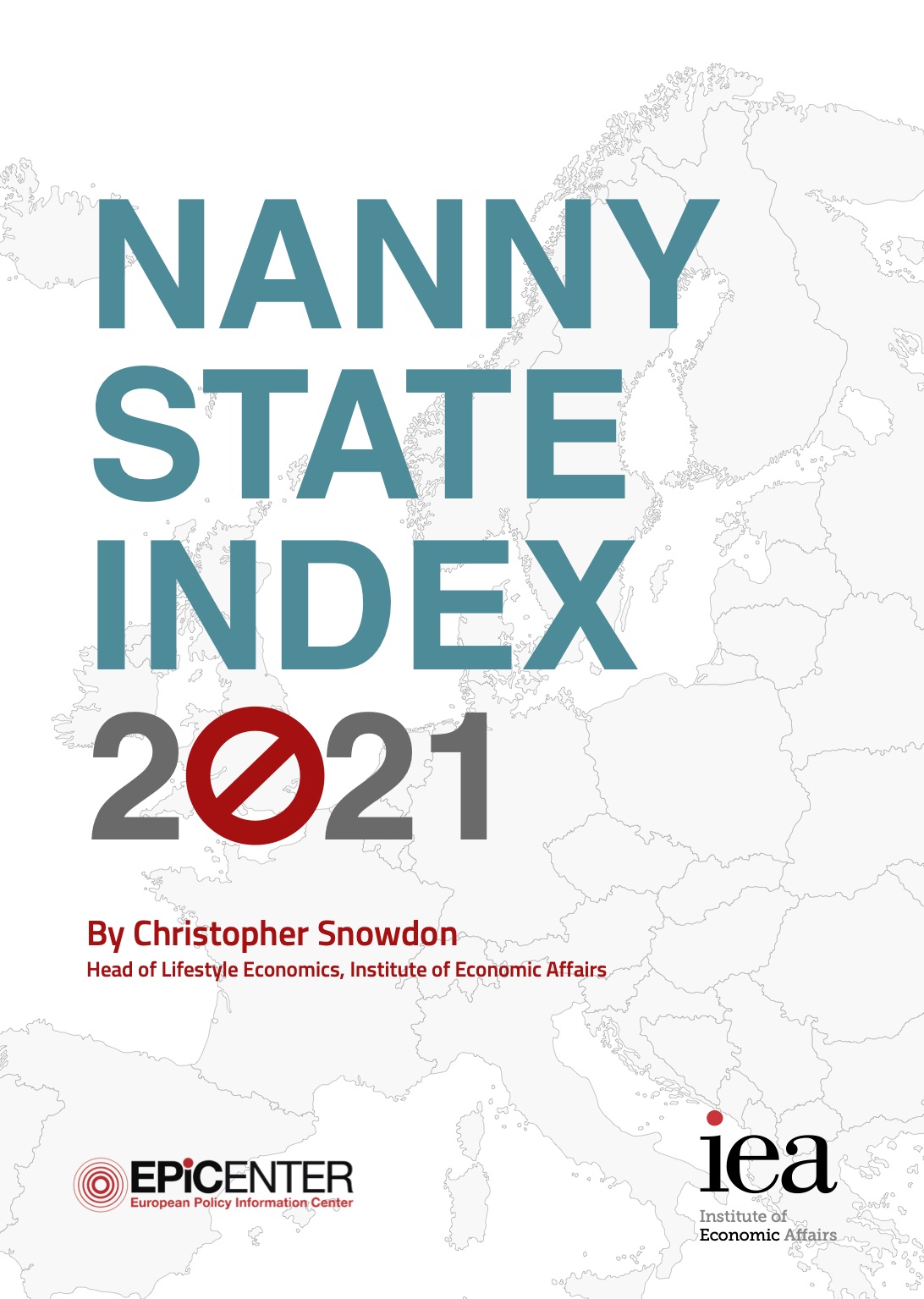
Germany is the best country to drink, smoke, vape and eat in the EU, although some parts are better than others if you are a smoker. There is no tax on e-cigarette fluid, no sugar tax and it has a largely liberal advertising regime. There is no wine duty and tax on beer and spirits are well below the EU average. Tobacco taxes in Germany are lower than the EU average after adjusting for income.
Like most European countries, Germany displays a somewhat hostile attitude towards smokers, but most federal states have tolerant legislation on smoking indoors. Smoking restrictions vary by region but bans are generally less draconian than those of other European countries. Only three of the sixteen states have a comprehensive smoking ban. The other 13 have significant exemptions based on the size of the premises, the status of the establishment (eg. private club) and whether or not food is served. The result is that in the majority of German states some bars have a designated smoking room at the minimum.
There is no vending machine ban or display ban for cigarettes and although most tobacco advertising is banned under EU law, German law permits it in cinemas, outdoors and at point of sale. Germany allows alcohol advertising in all its forms, including on television after 6pm, and there is no statutory closing time for bars.
E-cigarettes can be sold and used without restriction. There is no excise tax on vape juice, cross-border sales are legal and e-cigarette products can be advertised within the confines of EU legislation.
Germany has no nanny state policies on food and soft drinks, but the government has recently entered a ‘voluntary’ agreement with industry to reformulate food products. The plan is to achieve a reduce in sugar consumption of at least 10 per cent by 2025.
With thanks to Max Molden, Prometheus Institute
About
The Nanny State Index (NSI) is a league table of the worst places in Europe to eat, drink, smoke and vape. The initiative was launched in March 2016 and was a media hit right across Europe. It is masterminded and led by IEA’s Christopher Snowdon with partners from all over Europe.
Enquiries: info@epicenternetwork.eu
Download Publication

Previous version: 2019
Categories
About the Editor
Christopher Snowdon is the head of Lifestyle Economics at the Institute of Economic Affairs. His research focuses on lifestyle freedoms, prohibition and policy-based evidence. He is a regular contributor to the Spectator, Telegraph and Spiked and often appears on TV and radio discussing social and economic issues.
Snowdon’s work encompasses a diverse range of topics including ‘sin taxes’, state funding of charities, happiness economics, ‘public health’ regulation, gambling and the black market. Recent publications include ‘Drinking, Fast and Slow’, ‘The Proof of the Pudding: Denmark’s Fat Tax Fiasco’, ‘A Safer Bet’, and ‘You Had One Job’. He is also the author of ‘Killjoys’ (2017), ‘Selfishness, Greed and Capitalism’ (2015), ‘The Art of Suppression’ (2011), ‘The Spirit Level Delusion’ (2010), ‘Velvet Glove, Iron Fist’ (2009).
Germany 2019

Germany is the best country to drink, smoke, vape and eat in the EU, although some parts are better than others if you are a smoker. There is no tax on e-cigarette fluid, no sugar tax and it has a largely liberal advertising regime. There is no wine duty and tax on beer and spirits are well below the EU average. Tobacco taxes in Germany are lower than the EU average after adjusting for income.
Like most European countries, Germany displays a somewhat hostile attitude towards smokers, but most federal states have tolerant legislation on smoking indoors. Smoking restrictions vary by region but bans are generally less draconian than those of other European countries. Only three of the sixteen states have a comprehensive smoking ban. The other 13 have significant exemptions based on the size of the premises, the status of the establishment (eg. private club) and whether or not food is served. The result is that in the majority of German states some bars have a designated smoking room at the minimum.
There is no vending machine ban or display ban for cigarettes and although most tobacco advertising is banned under EU law, German law permits it in cinemas, outdoors and at point of sale. Germany allows alcohol advertising in all its forms, including on television after 6pm, and there is no statutory closing time for bars.
E-cigarettes can be sold and used without restriction. There is no excise tax on vape juice, cross-border sales are legal and e-cigarette products can be advertised within the confines of EU legislation.
Germany has no nanny state policies on food and soft drinks, but the government has recently entered a ‘voluntary’ agreement with industry to reformulate food products. The plan is to achieve a reduce in sugar consumption of at least 10 per cent by 2025.
With thanks to Max Molden, Prometheus Institute

 Austria
Austria Belgium
Belgium Bulgaria
Bulgaria Croatia
Croatia Cyprus
Cyprus Czech Republic
Czech Republic Denmark
Denmark Estonia
Estonia Finland
Finland France
France Germany
Germany Greece
Greece Hungary
Hungary Ireland
Ireland Italy
Italy Latvia
Latvia Lithuania
Lithuania Luxembourg
Luxembourg Malta
Malta Netherlands
Netherlands Norway
Norway Poland
Poland Portugal
Portugal Romania
Romania Slovakia
Slovakia Slovenia
Slovenia Spain
Spain Sweden
Sweden Turkey
Turkey United Kingdom
United Kingdom


















